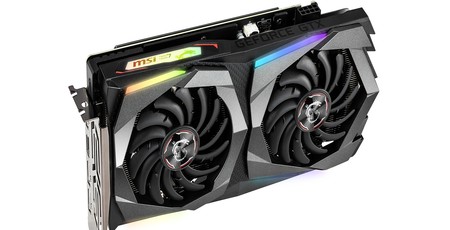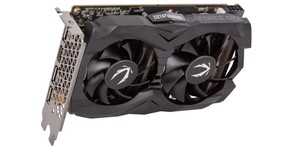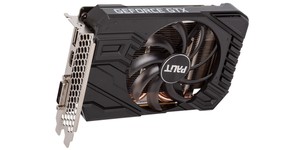Performance Analysis
In the interest of transparency, we needed to test this graphics card on a physically different test system to our usual one due to staff illness, but we replicated the CPU, overclock, and motherboard, and we used the same Windows install on the same SSD. The memory was 2 x 16GB instead of 4 x 8GB, but the frequency was the same. Based on cross-compared results from a previously tested card, we are confident the results are within tolerable margins and thus directly comparable to the others that you see in the charts.
This £250 graphics card is effective at 1080p across the board. There are a few dodgy minimum results that are benchmark-specific, but generally you can expect a quality gaming experience at this resolution.
Despite memory bandwidth limitations, it also still has a decent amount of power in the tank at 1440p, with a particularly strong showing in Wolfenstein II where the Turing architecture is leveraged properly via variable refresh rate shading and has a 99th percentile frame time equivalent to 61fps even at this higher resolution. Deus Ex, however, reveals that more challenging games will be too demanding with maximum settings at 1440p. GTX 1660 will see you through a 1440p monitor upgrade, but if you already have one it might not be the most long-lasting solution. Any current-gen VR headset users will be well served by GTX 1660, though.
The challenge for cards like this one that go all-out with cooling and features is the presence of the GTX 1660 Ti just above; Palit's GTX 1660 Ti StormX, for example, is undoubtedly basic and unexciting, but it offers a full 14 percent more performance thanks simply to the extra cores and memory bandwidth of the fully enabled TU116 GPU.

Next to relevant AMD hardware, large differences emerge on account of how different games are able to leverage different architectures effectively or not. This GTX 1660 tends to be faster than the RX 590, for instance, but Deus Ex and Total War: Warhammer II show this isn't always the case. Vega 56, meanwhile, has seen dramatic price cuts to the point where decent custom cards are available at £290 and reference ones (which we don't recommend thanks to the mediocre cooler) for as little as £270, which is problematic for GTX 1660 again since Vega 56 is a proper 1440p powerhouse that in our tests is almost 30 percent faster than MSI's offering.
The Twin Frozr 7 cooling solution is expensive but effective, delivering the ideal combination of low temperatures and near-silence even when under heavy sustained load. With fans that switch off in low-load states, we can hardly ask for much more, except perhaps a lower price.
Overclocked, we managed to squeeze around eight percent more performance from the card in a couple of games at 1440p, putting the card near enough on a level with reference GTX 1660 Ti cards, albeit not quite.
Conclusion
With fewer active cores and considerably less memory bandwidth, the repurposed TU116 GPU in the guise of GTX 1660 is a stellar card for gaming at 1080p. While MSI's overclock here skews the results compared to "baseline" performance, in-game differences between cards won't matter much outside of benchmarks. At £200, then, which is Nvidia's supposed MSRP for basic, stock-clocked units, the GTX 1660 makes sense, although readers should note that it does not qualify for any free game bundles.

The problem that Nvidia's partners will face, however, is keeping pricing in check for cards with overclocks and custom coolers, and this is a problem made quite evident by MSI's Gaming X card. £250 is a full 25 percent higher than MSRP, a difference which the core overclock nowhere near accounts for in performance. We're not saying build quality, features, and cooling performance count for nothing, and MSI excels on all three fronts, but mid-tier GPUs paired with top-tier coolers frequently run into the problem of encroaching on the pricing segment of the next card up, which invariably has more performance just as GTX 1660 Ti does. Worse still, Vega 56 is tantalisingly close to the price of this MSI card, and no amount of overclocking is going to close that gap.
In summary, then, the GTX 1660 is a decent outing from Nvidia, but the closer to MSRP the better. MSI's Gaming X card has quality to its name, but the pricing means that only those invested in MSI's RGB ecosystem are likely to see the appeal. For everyone else, mid-tier solutions (MSI's own Ventus, for instance) will be a better bet.

MSI MPG Velox 100R Chassis Review
October 14 2021 | 15:04









Want to comment? Please log in.